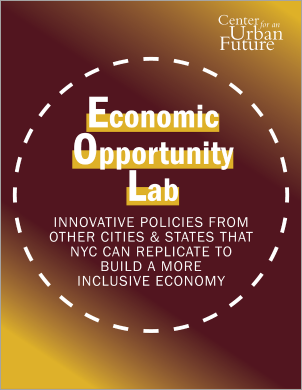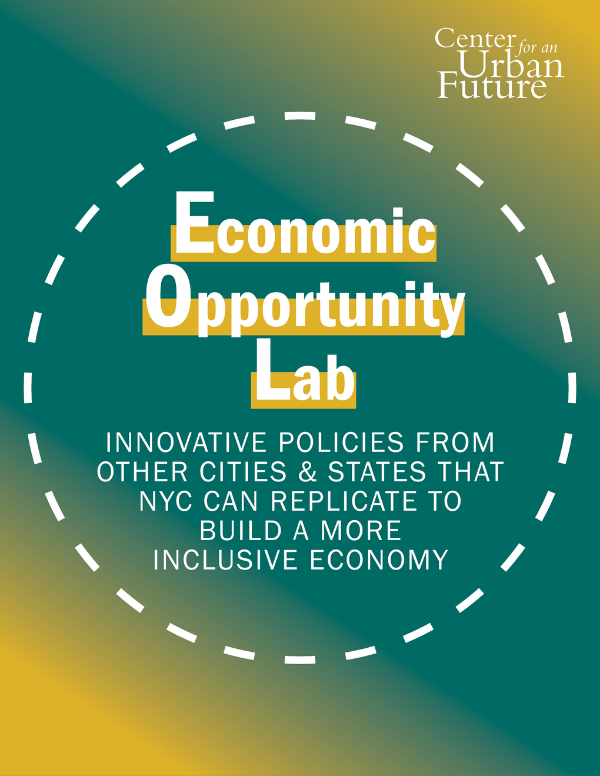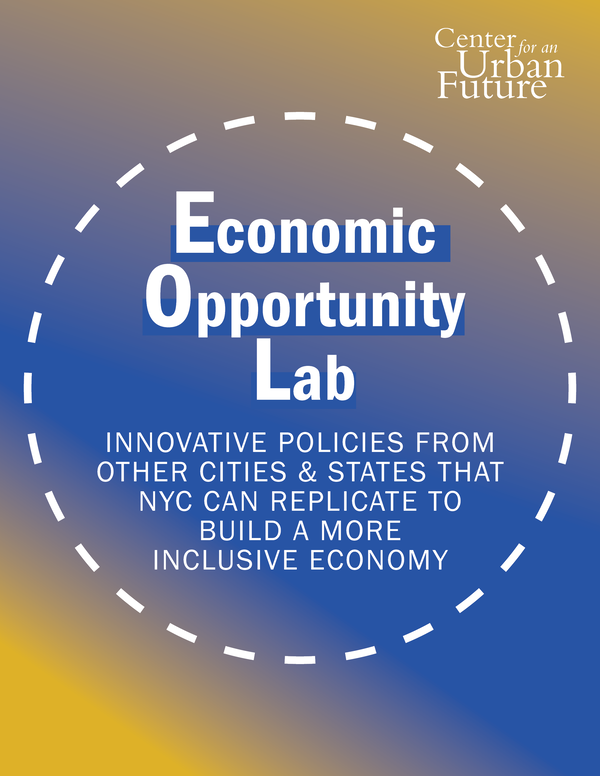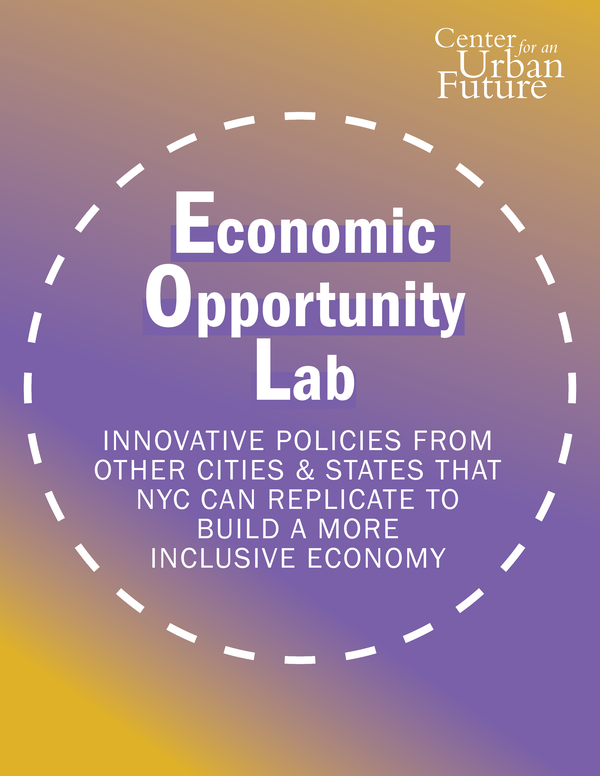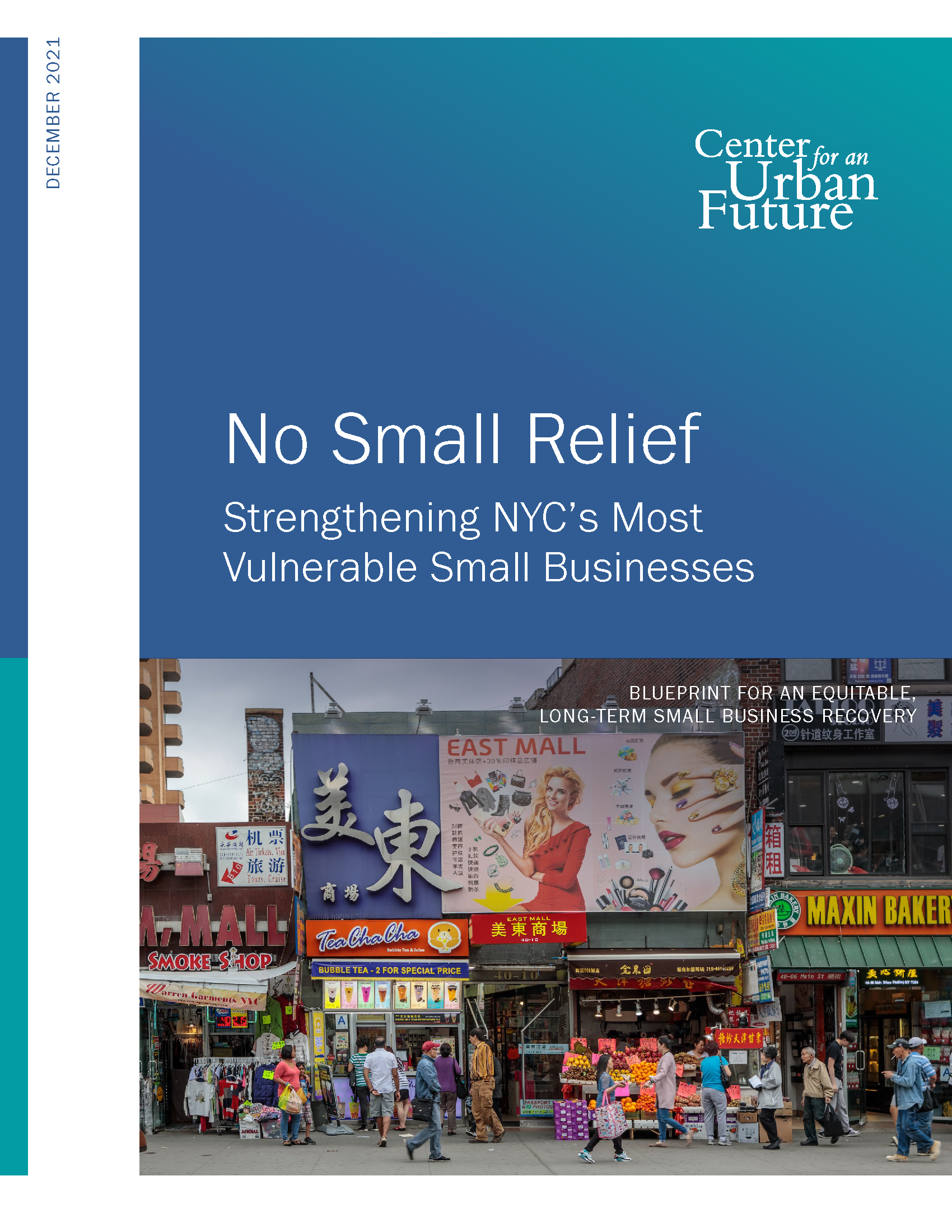
New York City’s 64,500 minority-owned employer businesses are already vital engines of the city’s economy. But there is an enormous untapped opportunity to help more of these mostly small minority-owned businesses to grow into medium-sized and large businesses, a prospect that, if realized, would build generational wealth in communities of color, produce more good jobs for New Yorkers of color, and contribute to a more equitable economy for the long term.
City leaders should look to an innovative program in Cincinnati, the Minority Business Accelerator (CMBA), that is helping to do just that. Since 2003, the CMBA has worked to help more than 70 minority-owned small businesses scale up by providing them with strong individualized business strategy and support, access to capital to finance expansion, and, perhaps most importantly, commitments from major companies in the region to direct significantly more procurement dollars their way. While the program has worked with a relatively small number of minority-owned businesses, that is a deliberate part of the strategy: the idea is not to help every small business develop a growth strategy, but rather to identify established minority-owned businesses that are already poised for growth—but which might not realize that promise without these strategic interventions.
This multifaceted approach is generating results, launching many minority-owned small businesses into a whole different echelon. Since the CMBA’s inception in 2003, the Accelerator has helped portfolio firms generate more than $1.2 billion in aggregate annual revenues. These companies have created around 3,500 jobs since joining the program and expect to add another 3,000 jobs in the next five to seven years.
This model shows significant promise for replication in New York City, where minority-owned firms experience stark disparities in terms of revenue, employment, and access to corporate procurement and supplier opportunities. The city’s average minority-owned employer business generates less than half the revenue—45 percent—of the average white-owned employer business, making businesses less able to hire and grow, and more likely to be vulnerable to a financial shock like the current COVID-fueled economic crisis.
By working to narrow these gaps in revenues and employees, New York City could help spark thousands of local employment opportunities and channel billions of dollars in new spending into communities of color. Based on our analysis, raising the average number of employees of minority-owned employer firms (6.9) to match the average at white-owned firms (11.9) would create 325,819 jobs, while raising the average revenues of minority-owned employer firms ($1.07 million) to match the average of white-owned firms ($2.22 million) would generate more than $63 billion in additional annual revenue for NYC's minority-owned businesses.1
Realizing this opportunity will require new investments that New York City has historically lacked: a major citywide effort focused specifically on helping minority-owned businesses break into private sector supply chains and take their businesses to the next level. New York is already home to a number of strong small business assistance organizations that would be core partners in replicating the Minority Business Accelerator model, including the borough-based chambers of commerce, community development financial institutions (CDFIs), community development corporations, and minority entrepreneurship programs operated by the New York City Department of Small Business Services (SBS), the city’s public libraries, and more. But much of the city’s existing small business assistance funding and programming is focused on start-up and survival; by comparison, the opportunity to help supercharge more of the city’s growth-oriented minority-owned businesses remains largely untapped. With top-level leadership and the support of the city’s business community, Mayor Eric Adams could bring these organizations together with leading private sector firms to form a NYC Minority Business Accelerator, drawing on lessons learned from Cincinnati to help dramatically boost revenues and jobs among the thousands of minority-owned employer firms citywide that are poised for growth.
The Policy
In 2001, Cincinnati police killed Timothy Thomas, an unarmed 19-year-old Black man. In the following years, a civic panel called Cincinnati Community Action Now issued recommendations to study and address the racial disparities in the region, considered root causes of the social unrest that spread through the city following the death. The Minority Business Accelerator was originally born of the recommendation to focus on expanding economic opportunity for Cincinnati’s Black community.
The idea was that by investing in growing Black and other minority-owned business and helping them scale into larger firms, these businesses would be more likely to create jobs for residents of the city’s majority-minority communities, which had long experienced high rates of unemployment, and send ripples of additional spending and investment throughout the region.
“There just has to be in my mind this more intentional and quite frankly, unapologetic focus on scale,” says Darrin Redus, the Accelerator’s chief executive officer. “Scaling up more minority-owned businesses is not a zero sum game. You're creating businesses that create jobs for all citizens. It is an economic lift to the region as a whole.”
The Minority Business Accelerator provides their portfolio companies with support refining business strategies, accessing to capital, and connecting with major corporations in the region. According to Redus, portfolio firms are required to have annual sales of at least $1 million, a business-to-business or business-to-government revenue model, the desire to scale to the next level, and potential for growth within the next two to five years. The Accelerator has a two-pronged strategy: it supports portfolio companies through coaching, by providing them with business assessment, capital readiness support, and strategic planning, and then connects them with major corporations, called “goal setters,” that are looking to increase the share of their firm’s spend on products and services provided by minority-owned businesses.
Critical to the CMBA’s success is this engagement with—and buy-in from—major corporations operating in the region. “That matchmaking and those strategic introductions and their connectedness to the corporate community is really part of what has helped them catapult so many of these minority-owned businesses from a million-dollar-plus in annual revenue to the next level,” says Joan Spirytus, a managing associate with Next Street, a small business advisory firm, which worked with the Cincinnati Minority Business Accelerator to develop a “playbook” to codify its strategy and understand what has enabled the model’s success, with the goal of scaling impact by bringing the model to other cities and regions.
While the Cincinnati city government has been very supportive of the Accelerator, the backing of the region’s business community has been key to the program’s success. Those involved with the program have credited part of its effectiveness to its proximity to the region’s business leaders. Because it’s housed within the Cincinnati Regional Chamber of Commerce, the Accelerator team has a seat at the table among the region’s leading employers and enjoys access and credibility among local corporate and government leaders that might not be so readily available to them in another setting.
“When I think about policies, so much of it is we have got to do a better job, in my mind, of setting more intentional objectives about more inclusive outcomes,” says Redus. Following the murders of George Floyd and Breonna Taylor, the growing movement for racial justice, and the unequal impact of COVID-19 on communities of color nationwide, a growing number of cities are turning toward this model as part of developing a substantive policy response. To date, 29 cities across the country have turned to Cincinnati and the Accelerator in search of a workable model that focuses on helping Black and other minority-owned businesses grow.
“Research shows that Black-owned companies hire Black people more [often] than particularly mainstream companies,” says Michael Coffey, director of the Racial Justice Fund at the Greater Cincinnati Foundation. “You can strike at the branches all day, but the roots are still going to be unscathed and nothing will change. So the more success Darrin and his team has, the more we can really close the income inequality gap but also really get at wealth building.”
The Challenge
Over the past decade, New York City has benefited from strong growth in minority-owned businesses. New York City is home to more than 64,500 minority-owned firms with employees—more than the total number of businesses in Dallas, San Francisco, or Philadelphia—with those numbers increasing every year.2 The number of Black-owned businesses increased at four times the rate of white-owned businesses in the city between 2012 and 2017.
Despite these important gains, minority-owned businesses remain significantly smaller than their white-owned counterparts, generating lower average revenues and employing roughly half as many New Yorkers, on average. There is little doubt that hundreds or thousands of minority-owned employer firms across the city are poised for significant growth, but challenges around access to capital and the technical assistance needed to fuel expansion—as well as remarkably little focus at the city level on helping drive more private sector spending toward these firms—are restricting the growth potential of minority-owned businesses citywide.
New York City needs long-term, systemic change and support that goes beyond COVID-specific relief initiatives. A Minority Business Accelerator built on the Cincinnati model could not only serve to help more businesses become financially resilient, it could form the centerpiece of a redoubled effort to narrow the city’s racial wealth gap.
1. NYC has a huge, underrealized opportunity to channel far more private sector spending toward minority-owned businesses.
With a gross city product of $776 billion annually, the headquarters of 46 Fortune 500 companies, and more than 111,000 employer businesses in total, New York City’s private sector is an enormous consumer of goods and services.3 But while a growing number of firms with a presence in New York have made individual commitments to direct more purchasing toward minority-owned businesses—from JPMorgan Chase and Meta to Accenture and Con Edison—there has been relatively little focus at the city level on encouraging a much larger and broader array of firms to pursue aggressive supplier diversity goals at the local level.
“Just about 10 percent of corporate spending is done with disadvantaged groups,” says Kelly Burton, executive director of Black Innovation Alliance, a national coalition of organizations focused on supporting Black entrepreneurs, “which means the amount of spending done with businesses led and owned by people of color tends to hover in the single digits.”
A more ambitious and deliberate effort on the part of city government to help connect private sector companies with minority-owned businesses in New York City could help significantly increase the impact of existing minority-owned business certification programs, growing far beyond the $1.16 billion that the city itself spends with minority- and women-owned businesses annually.4
While city government has taken some steps to help small businesses break into private sector procurement—including by launching the Corporate Alliance Program at SBS, which connects small businesses with partner corporations through workshops, mentorships, and contracting opportunities—these programs have been notably limited. For example, the Corporate Alliance Program has just sixteen partner firms and has not accepted new mentee companies since 2019.5
Camille Newman, director of the Brooklyn Women's Business Center, a nonprofit that provides free one-on-one business coaching to entrepreneurs in East New York, and founder of the plus-size fashion company Body by Love, says encouraging procurement opportunities between minority-owned businesses and large private corporations is an essential—but underresourced—strategy for enabling more small businesses to get to the next level. Absent those opportunities, she says, too many businesses end up stuck, unable to generate enough revenue to reinvest in growth.
“Part of that is businesses of color just don't have the financial resources to scale,” she explains. “You'll often hear women of color say they're over mentored and still underfunded. It's one thing to provide the mentorship, but if you're not getting the help scaling, it really doesn't help the business to grow and to get to the point where they can become even more impactful in the community.”
2. NYC should focus on investing in the infrastructure needed to help more minority-owned businesses scale up.
Even if New York City succeeds in bending the spend of the private sector toward more minority-owned firms, those firms will need more sophisticated forms of technical assistance, including strategic and operational consulting, creative and flexible financing, legal advice, and other support in order to realize these opportunities, succeed in a competitive market, and ultimately achieve sustainable growth.
The problem is that many of the city’s publicly funded small business support programs focus on helping aspiring entrepreneurs start businesses or supporting existing mom-and-pop businesses, rather than providing successful minority-owned businesses with the support they need to scale.
“We have to do more programs to scale," says Newman. "Other cities have accelerator-based programs that identify 50 to 100 businesses and say, 'Let me walk you through how to get from, say, $30,000 to $150,000 in sales. We can’t say we support small businesses without concrete steps to take them to the next level."
Fortunately, New York City is already home to a number of trusted small business assistance and development organizations, including those run by the five borough-based Chambers of Commerce, federally funded Small Business Development Centers, CDFIs, nonprofit development corporations, community-based organizations, public libraries, and city-funded Business Solutions Centers. But most of these programs are small and focused on helping aspiring entrepreneurs start or supporting the operations of mom-and-pop businesses, with just a handful of full-time staff dedicated to small business development, let alone business acceleration. Likewise, there is a relative lack of city funding, programming, and technical assistance specifically focused on helping established minority-owned businesses modernize their operations, implement cutting-edge technology, expand into new markets, and take their revenues, hiring, and operations to the next level.
By working with these small business assistance organizations, and taking cues from the Cincinnati Minority Business Accelerator, Mayor Adams can tap into these organizations’ strengths while bringing major corporations to the table to help drive revenue and job growth.
“There's always been an issue of access to capital [for minority-owned businesses],” says Ibrahima Souare, senior community development officer at LISC NYC, a nonprofit focused on equitable community development. This challenge long predates the unequal economic impact of the pandemic and has made it harder for the city’s minority-owned businesses to finance their own growth—and brace themselves for an unanticipated economic shock. As the city looks to spur an equitable economic recovery from the pandemic, Souare says that now is the time for city leaders to act with “intentionality in addressing the racial wealth gap [and] racial equity issues, to position Black and other minority groups to raise their economic status.” This will require a new level of investment in the infrastructure needed to help small businesses grow.
Conclusion
New York City has long benefited from its position as a stronghold of successful minority-owned businesses, but significant disparities in revenues, employees, and growth opportunities remain. Addressing these disparities will require a new level of investment in policies and programs designed to help those businesses grow: by bending the spend of private sector procurement dollars toward minority-owned businesses, and investing in technical assistance focused on the financing, operational, logistical, hiring, and supply chain challenges that mount as a business begins to scale.
As Mayor Adams and the City Council look for effective ways to help narrow the city’s racial wealth gap and expand economic opportunity in communities of color, they should consider replicating Cincinnati’s Minority Business Accelerator model. Built in partnership with the city’s established small business support organizations, launched with major corporate partners, and focused squarely on helping firms scale, a NYC Minority Business Accelerator would address existing gaps in small business support and could help minority-owned businesses generate millions of dollars in new revenue, create thousands of local jobs, and cultivate a more equitable economy across all five boroughs.
Endnotes
1 Center for an Urban Future analysis of data from the U.S. Census 2018 Annual Business Survey, released in May 2020. This is the most recent survey to collect data at the county level for minority business ownership.
2 NYC Minority Businesses in Flux: Black- and Asian-Owned Businesses Grow While Hispanic-Owned Decline, September 2020, Center for an Urban Future.
3 NYC EDC, “COVID-19 and the New York City Economy,” March 2021.
4 Economic Opportunities for M/WBEs under Local Law 1 of 2013.
5 CAP/NYCEO M/WBE Mentorship Program Application.
